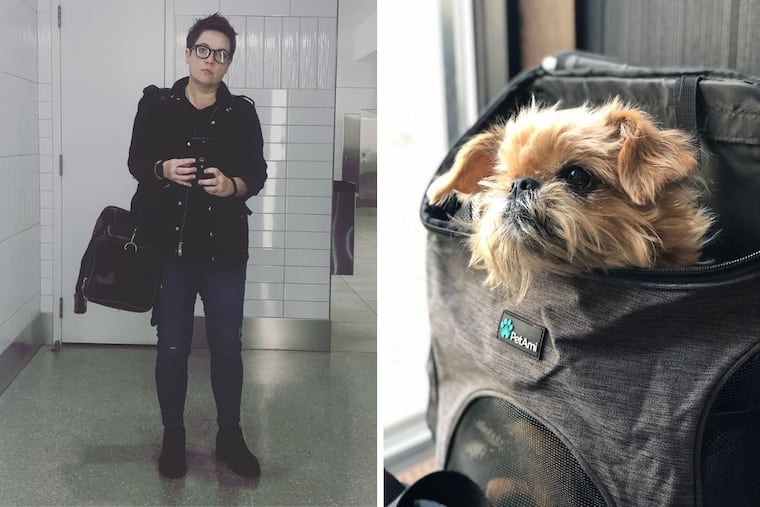My dog is my BFF and an emotional support animal. Airlines should respect that. | Opinion
As airlines consider cracking down on emotional support animals, I know I couldn't fly without my pup.

Until last year, it had been at least 10 years since I stepped foot on an airplane. But it wasn’t always like that. I traveled overseas many times and traveled for work a lot, often crisscrossing the country every few weeks. But like a spill that keeps shifting shape and taking over more and more space, I developed an inexplicable anxiety that eventually made even the thought of boarding a plane feel like a punishment worse than death. And I simply stopped flying.
Today, it’s still somewhat hard to admit that I allowed fear to control my life for so long. It was only until I admitted it to myself, and spent several years working on creating cognitive changes, that I was able to start the process of, well, healing.
A major part of this personal transformation came in the form of my fuzzy 9-pound Brussels Griffon, Louise, who is my emotional support animal (ESA) and more. Not only does a loyal pet provide a certain stabilization for someone who suffers from panic disorder — in my case, she also allows me to focus on something other than myself. And while I’ve had Louise since she was a puppy (she’s now 13), it never occurred to me that she could be a key to my ongoing therapy.
» READ MORE: Jefferson Health will help test travelers for COVID-19 at Philadelphia International Airport
That’s why I was disheartened recently to learn that airlines are considering cracking down on ESAs. Given the anxiety many people are enduring these days, I can’t think of a worse time to reconsider a program that gives people like me the support they desperately need.
I was fortunate that Louise has always been a great traveling companion. Compact, she likes riding in pet carriers, and has driven, sailed, taxied, biked, Ubered, and chugged on a train with me. So when it came to taking my first flight again across the country last year, Louise was by my side. And for the first time in more than a decade, I didn’t feel so helpless. In fact, I felt empowered, not only from the emotional work I was doing on my own but also from having my best friend beside me on the journey.
I was initially inspired to look into the ESA program after a friend had luck with it. I talked to a therapist, who evaluated both me and the dog, and confirmed that not only was Louise well-behaved, met the criteria, and ultimately made a good fit but that she was obviously providing me emotional support. I now simply travel with a letter from the therapist designating Louise as my ESA.
» READ MORE: Trying to cope with fears about coronavirus? Get a dog. | Opinion
Together, we took several cross-country flights last year before the pandemic. And I can say for the first time in a long while, I enjoyed the adventures. So instead of eliminating the program, or making it difficult for people who are already struggling, I have a few suggestions that may help make it work for everyone:
Limit the animal to a dog or cat. I realize that people may have connections with other animals, like snakes and ponies, but obviously, the logistics of traveling with a more “exotic” animal can create problems for other passengers and staff.
Consider size restrictions. My dog is considered carry-on luggage because she (inside her airline-approved carrier) fits under my seat.
Make sure your pet is well-behaved and comfortable on a plane. A dog that’s barking, crying, or carrying on is not emotionally soothing to anyone.
Finally, I’d encourage anyone who is trying to pass off a pet as an ESA to actually see a therapist and go through the right channels. The process is part of the therapy, and can ultimately provide some proof that both you and your pet have this important relationship.
Since Louise is 13, I know she won’t be with me forever. But she’s taught me a lot about resilience. At a time when many folks are feeling the strain of political upheaval, a pandemic, and overall uncertainty about the future, being able to focus on something positive and feeling a lot less alone can mean the difference between sitting out life and actually living it.
Natalie Hope McDonald is a writer and artist based in Philadelphia.